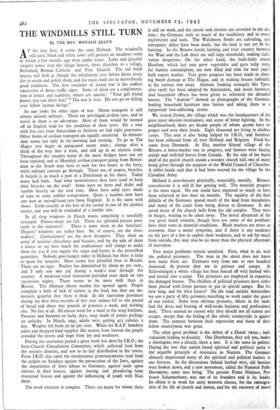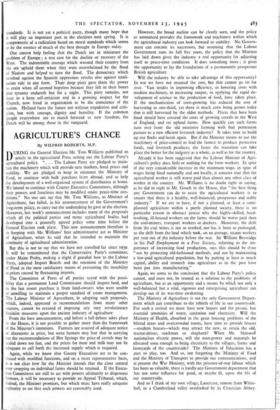THE WINDMILLS STILL TURN
By THE REV. RONALD ALLEN AT the very first, it seems the same Holland. The windmills still turn, black and white cows still pasture on meadows some of which a few months ago were under water. Lofty and graceful steeples tower over the village houses, three churches to a village, Reformed, Roman Catholic and Free Church. The red brick houses still look as though the inhabitants rose before dawn every day to scrub and polish them, and the main roads are in marvellously good condition. The first reminder of recent war is the endless succession of Army traffic signs. Some of them are a conglomera- tion of letters and numbers, others are caustic: " Your girl friend knows you can drive fast," " The war is over. Do not go on killing your fellow human beings."
So one looks for other signs of war. Motor transport is still almost entirely military. There are privileged civilian cars, and to travel in them is an adventure. Most of them would be warned off an English road for the condition of their tyres. On a tour with five cars from Amsterdam to Arnhem we had eight punctures. Other forms of civilian transport are equally restricted. In Amster- dam trams run only in the morning and evening. To go to The Hague you begin in antiquated steam train ; change after a third of the way into a tram, and end up in an electric train. Throughout the country many of the main bridges have not yet been repaired, and at Moerdyk civilian transport going from Rotter- dam to the South may have to wait for two hours at the ferry, while military convoys go through. There are, of course, bicycles. A bicycle is as much a part of a Dutchman as his shoes. Today many lack both. And what -inventiveness they have used to keep their bicycles on the road! Some have no tyres and shake and rumble heavily on the iron rims. Most have solid tyres made of rope or some rubber composition. Quite a number now have one new or second-hand tyre from England. It is the same with shoes. Look casually at the feet of the crowd in one of the poorest streets, and you will be reminded of a jumble sale.
In all shop windows in Dutch towns something is tastefully arranged. Flower-shops are full. There are splendid picture post-
cards in the stationers'. There is some meat in the butchers'. Drapers' windows are rather bare. So, of course, are the shoe- makers'. Confectioners' are the most deceptive. They show an array of luscious chocolates and biscuits, and by the side of them a notice to say how much the confectioner will charge to make them for you if you supply the sugar and butter in the prescribed quantities. Nobody goes hungry today in Holland, but there is little to spare for luxuries. Meat seems less plentiful than in Britain. There are no eggs. Poultry has diminished by about 90 per cent., and I only saw one pig during a week's tour through the country. A moderate-sized restaurant provided roast duck on two successive nights. There seems to be more milk than in Britain. The Alkmaar cheese market has opened again. People complain a little of lack of variety in the food, but they are im- mensely grateful that there is food. In the starvation provinces during the first three mcnths of this year rations fell to one pound of bread and about two pounds of potatoes a week, and nothing else. No fats at all. All classes went for a meal to the soup kitchens. Potatoes and beetroot on lucky days, soup made of potato peelings on unlucky. In March, 1945, adults were getting 413 calories a day. Weights fell from 25-3o per cent. When the R.A.F. bombers came and dropped food supplies like manna from heaven the people crowded the streets and wept from joy and weakness.
During the starvation period a great work was done by I.K.O., the Inter-Church Consultation Committee, which collected food from the country districts, and saw to its fair distribution in the towns. From I.K.O. also came the simultaneous pronouncements read from the pulpits on Sundays against the persecution of the Jews, against the deportation of slave labour to Germany, against raids upon citizens in their houses, against looting and plundering from evacuated houses and against the influencing of youth with Nazi ideas.
The work situation is complex. There are many for whom there
is still no work, and the streets and cinemas are crowded in the day time ; the Germans stole so much of the machinery and so many implements and tools. The Walcheren floods are subsiding, and emergency dykes have been made, but the land is not yet fit for farming. In the Betuwe fertile farming and fruit country between the Waal and the Lek there are still large minefields, making culti- vation dangerous. On the other hand, the bulb-fields round Haarlem, which last year grew vegetables and gave tulip roots for human consumption, are now filled and trim for next year's bulb export market. Very great progress has been made in clear- ing bomb damage at The Hague, and in making houses habitable in the various war areas. Arnhem (looking strangely like Ypres after 1918) has been adopted by Amsterdam, and much furniture and household effects has been given to refurnish the denuded houses. The " domine " showed us photographs of the Germans loading household furniture into lorries and taking them to a signposted loot-collecting centre.
We visited Zetten, the village which was the heladquarters of the great inner mission institutions, and scene of bitter fighting. In the neighbourhood, there are 6o,000 people of whom 40,000 have no proper roof over their- heads. Eight thousand are living in chicken coops. This area is also being helped by I.K.O., and furniture has been collected from all over Holland and Belgium. Food has come from Denmark. At Elst, apother blitzed village of the Betuwe, a horse-market was in progress, and farmers were buying sturdy and well-fed horses from Canada. By the side of the burnt shell of the parish church stands a wooden church hall, one of many being given through the auspices of the World Council of• Churches. A tablet inside said that it had been erected for the village by the Canadian Army.
Holland is convalescent physically, materially, morally. Because convalescent it is still ill but getting well. The material progress is the most rapid. No one could have expected so much to have been achieved in less than six months. The rapidity of the final debacle of the Germans spared much of the land from inundation, and many of the cattle from being driven to Germany. It also saved many of the church bells from the old steeples. They were in barges, waiting to be taken away. The moral aftermath of the war gives much concern, though here too some of the problems have their roots in material conditions. Black markets are more an economic than a moral symptom, and if there is any tendency on the part of a few to exploit their weakness, and to ask for much from outside, this may also be no more than the physical aftermath of starvation.
Two major problems remain unsolved. First, what to do with the political prisoners. The man in the street does not know how many there are. Estimates vary from one to two hundred thousand. At present they are in prisons and camps. At Scheveningen a whole village has been fenced off with barbed wire and turned into a camp. The prisoners are employed in repairing the damaged houses. The children of political prisoners have either been placed with foster parents or put in special camps. But for how long, and for what future? On the road outside Amsterdam we saw a party of fifty prisoners marching to work under the guard of one soldier. Some were obvious peasants, others in the ranks had the dress and bearing of well-to-do business and professional men. There seemed no reason why they should not all scatter and escape, except that the feeling of the whole countryside is against them. The ,contrast between their expression and those of their fellow countrymen was great.
The other great problem is the defect of a Dutch virtue ; indi- vidualism leading to disunity. One Dutchman, they tell you, makes a theologian, two a church, three a sect. It is the same in politics. During the war that nation found spiritual and political unity in thE negatifre principle of resistance to Nazism. The Germans obtusely imprisoned many of the spiritual and political leaders in one fortress. In the discussions behind barbed wire, old barriers were broken down, and a new movement, called the National Folks Movement, came into being. The present Prime Minister, Pro- fessor Scharmerhorn, vas one of its founders and is its leader. Its object is to work for unity between classes, for the reintegra- tion of the life of church and nation, and for the recovery of moral
standards. It is not yet a political party, though many hope that it will play an important part, in the elections next spring. It is symptomatic of a radicalism based on moral standards which seems to be the essence of much of the best thought in Europe today.
One cannot help feeling that the Dutch are in miniature the problem of Europe ; a test case for the decline or recovery of the West. The indomitable courage which wrested their country from the sea -upheld them when they were overwhelmed by the flood of Nazism and helped to turn the flood. The democracy which revolted against the Spanish oppression revolts also against totali- tarian rule in any form. Their deep piety gave them the power to resist when alt seemed hopeless because they felt in their bones that tyranny endureth but for a night. This piety remains, not least in a keen self-criticism and in a growing respect for the Church, now freed in organisation to be the conscience of the nation. Holland faces the future not without trepidation and criti- cism, but with courage, dignity and humility. If the common people everywhere are to march forward to new freedom, the Dutch will be among those in the vanguard.



























 Previous page
Previous page